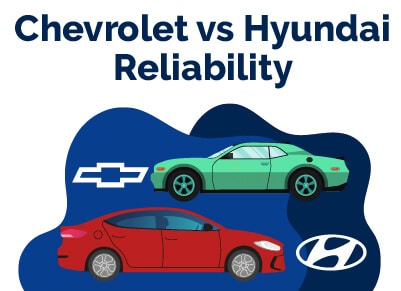Chevy vs Hyundai: Which Is More Reliable?
March 4, 2024


Chris is Head of Content for FindTheBestCarPrice and is based out of Philadelphia, PA. As a seasoned automotive industry analyst and car enthusiast, he ensures the highest level of quality across all our content and curates our picks for the best deals each month.
Chris studied information systems and marketing at Drexel University and writes about a wide range of topics ranging from car buying tips to troubleshooting common mechanical issues.
When he’s not thinking about cars, he likes to stay in with his dog and make an “attempt” to finish a crossword puzzle (he’s not quite at the Saturday/Sunday level…yet). As a former cheesemonger, Chris still has a “sharp” passion for all things cheese, and his fridge is always loaded with it!
Chris also has a passion for things that go fast, and drones are no exception. He spends some of his time writing for Dronesourced.
Hyundai and Chevy, both giants in the automotive arena, cater to a broad audience with their distinct offerings.
Chevy has earned acclaim for its robust trucks, whereas Hyundai is celebrated for its diverse lineup of SUVs and sedans.
Hyundai offers higher reliability, dependability, and higher safety ratings. Repair and maintenance cost is cheaper on Hyundai compared to Chevy. Hyundai also offers better warranty coverage than Chevy.
Chevy, on the other hand, is known for their strength in producing great trucks, design, and material choice, and interior and exterior fit and finish.
Our car-buying experts did the research to provide you with this detailed comparison of Chevy vs. Hyundai reliability.
Table of Contents
Key Takeaways
- Hyundai is significantly more reliable than Chevy
- Hyundai is ranked 3rd and 4th out of 32 car brands in terms of reliability while Chevy comes in at 20th
- If you are looking for a truck, however, Chevy makes them better than Hyundai
Chevy vs. Hyundai Reliability: A Detailed Comparison
| Features | Chevy | Hyundai |
| Gas Mileage | ||
| Durability | ||
| Safety | ||
| Technology | ||
| Repair and Maintenance Cost | ||
| Engine and Performance | ||
| Design |
Chevy vs. Hyundai Reliability: Which Is Better?
Hyundai is better than Chevy in reliability and outperforms Chevy in different categories, with better features.
According to RepairPal, Hyundai has a reliability rating of 4.0/5.0, ranking 4th out of 32 car brands. This is unlike Chevy, which ranks 20th out of 32 car brands, with a 3.5/5.0.
In the 2022 JD Power’s Dependability Survey, Hyundai became the third most dependable car brand, beating out Chevy with better dependability scores.
Hyundai has higher repair and maintenance costs and the frequency of major and minor damages. This is without fail to mention that Hyundai has the best warranty coverage in the auto industry.
The safety ratings on Hyundai are also better than Chevy. One of the major reasons why most drivers prefer Hyundai to Chevy is the frequency of repairs and damages. General Motors, the parent company of Chevy, doesn't have a reputation as high quality as Hyundai.
You might be unlucky with a Chevy and battling many expensive transmission and engine problems. Owning a Chevy comes with the possibility of costly repairs, from intake manifold problems to engine gasket failure to transmission faults.
Hyundai backs up its cars with a 10-year/100,000 miles warranty, leaving you to worry about just tire, oil changes, or brake pad or clutch replacement. This is unlike that which can leave you with premature engine wear, electrical malfunction, and shoddy quality.
Chevy vs. Hyundai Reliability: Design
Design is a subjective matter, and what one person finds attractive may not be the same for another. However, you must understand a vehicle's design or a brand's design philosophy to decide which is the best for you.
Chevy and Hyundai offer a range of designs in their vehicles, from sleek and sporty to more traditional and practical, with different approaches to their finishing. Hyundai has made a name for itself with its sleek and modern designs.
With the flowing lines, bold styling, and emphasis on premium looks and feel, Hyundai does everything in its power to live up to its design language 'Sensuous Sportiness.'
The Hyundai design language emphasizes emotional appeal and the need to create a strong visual impact. This is perfectly captured in the Hyundai Sonata.
Bold front grille, sleek headlights, flowing silhouette, spacious and ergonomic layout, and driver-centered interiors, aside from adopting a sporty and dynamic appearance, Hyundai cars achieve a comfortable and intuitive driving experience.
Chevy takes a more traditional and muscle car-inspired look, with bold lines and a focus on performance. This contrasts with Hyundai vehicles that focus more on efficiency and technology.
Chevrolet tilts toward using metallic and high-quality plastics in their interiors, while Hyundai vehicles often use softer, more premium materials such as leather and wood trim. Overall, the design of Chevrolet and Hyundai vehicles reflects each brand's different priorities and target markets.
Chevrolet vehicles are geared toward drivers who prioritize performance and a sporty appearance. By comparison, Hyundai vehicles are designed for those who value efficiency, technology, and a more premium look and feel.
Winner: Both
Chevy vs. Hyundai Reliability: Gas Mileage
You must understand that gas mileage on both brands varies greatly depending on the vehicle's specific model and engine size.
Chevy and Hyundai offer a range of efficient options that can help save on fuel costs. You will need to study the gas mileage of cars from these brands to get a grip on their approaches to fuel efficiency.
The 2021 Chevrolet Spark, a subcompact car, gets an EPA-estimated 30 mpg city, 38 mpg highway, and 33 mpg combined. This rating varies depending on the transmission you pick: manual or automatic.
The 2021 Chevrolet Malibu, a midsize car, gets an EPA-estimated 29 mpg city, 36 mpg highway, and 32 mpg combined. And the 2021 Chevrolet Silverado 1500, a full-size pickup truck, gets an EPA-estimated 16 mpg city and 22 mpg highway.
The 2021 Hyundai Accent, a subcompact car, gets an EPA-estimated 33 mpg city and 41 mpg highway, while The 2021 Hyundai Sonata, a midsize car, gets an EPA-estimated 28 mpg city, 38 mpg highway. And the 2021 Hyundai Santa Fe, a compact SUV, gets an EPA-estimated 22 mpg city and 28 mpg highway.
Both Chevrolet and Hyundai offer a range of vehicles with varying fuel economies. However, Hyundai has better gas mileage than Chevy.
It's important to note that fuel economy can vary based on several factors, including driving habits, terrain, and the specific trim level of a vehicle.
Winner: Hyundai
Chevy vs. Hyundai Reliability: Repair and Maintenance Cost
It is cheaper to repair and maintain a Hyundai than a Chevy. According to RepairPal, Chevy gets an average annual repair cost of $649. Although this is cheaper than the national average of $652 annually, it is costlier than what Hyundai offers.
Hyundai gets an annual average repair cost of $468. You will get an average 0.3 chance of visiting the repair shop and a 10% probability of severe damages. Chevy gets 0.3 and 15% probability, respectively.
Winner: Hyundai
Chevy vs. Hyundai Reliability: Safety and Technology
Both Chevy and Hyundai have a strong focus on safety and offer a range of advanced safety features in their vehicles.
Both brands have received high safety ratings from organizations such as the National Highway Traffic Safety Administration (NHTSA) and the Insurance Institute for Highway Safety (IIHS). Nevertheless, Hyundai is better than Chevy as regards safety and Technology.
Hyundai takes the lead with innovation and more cars, earning the 2022 IIHS Top Safety Pick(+) award. For example, Hyundai has introduced several advanced drivers assist systems and semi-autonomous driving features in its vehicles, while Chevrolet has been slower to adopt these technologies.
Unlike Chevrolet, which only has a safety award in the small SUV category, Hyundai has cars in almost every category: small and midsize cars, small and midsize SUVs, Midsize Luxury SUVs, and small pickups.
Winner: Hyundai
Chevy vs. Hyundai Reliability: Engine and Performance
Both Chevy and Hyundai offer a range of engines in their vehicles, ranging from small 4-cylinder to powerful V8 options. It is difficult to definitively say which brand has better engine performance, as it largely depends on the specific model and engine size.
However, by looking at popular models of both brands, we analyze the overall engine performance of Chevrolet and Hyundai vehicles.
The Chevy Silverado pickup truck offers a range of engines, including a 4.3-liter V6, a 5.3-liter V8, and a 6.2-liter V8. The largest of these engines produces 420 horsepower and 460 lb-ft of torque, making it capable of towing up to 13,400 pounds.
Chevy Camaro, which is a sports car, has a variety of engine options. The base engine is a 2.0-liter turbocharged four-cylinder that produces 275 horsepower, while the top-of-the-line engine is a 6.2-liter V8 that produces 650 horsepower.
The Hyundai Sonata, a popular mid-size sedan, comes with four types of engines: a 2.5-liter four-cylinder, a 1.6-liter turbocharged four-cylinder, a 2.0-liter turbocharged four-cylinder, and a hybrid powertrain.
The most powerful of these engines is the 2.0-liter turbocharged four-cylinder, which produces an impressive 290 horsepower.
The Hyundai Kona, a small crossover SUV, is available with a 2.0-liter four-cylinder engine that produces 147 horsepower and a 1.6-liter turbocharged four-cylinder engine that produces 175 horsepower.
Regarding engine performance, Chevrolet and Hyundai offer a range of options to suit different needs and preferences.
Chevrolet's Silverado and Camaro offer powerful V8 engines, while Hyundai's Sonata and Kona offer a variety of four-cylinder engines.
The Chevy engines are more powerful, but Hyundai's are more efficient. This implies you will also get more gas mileage on Hyundai but more horsepower on Chevy.
The right engine for you depends on your individual needs and driving style. Test-Driving cars from both brands will help you make better decisions.
Winner: Both
Conclusion
Hyundai and Chevy are great car brands. Although Hyundai is more reliable, you can consider Chevy for its powerful engines. The decision between both brands boils down to personal preferences.
Best Car Deals by Category
Posted in Car Buying Tips, Car Troubleshooting |




